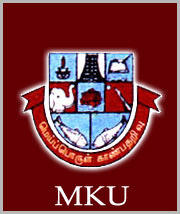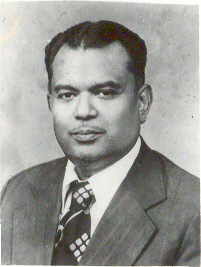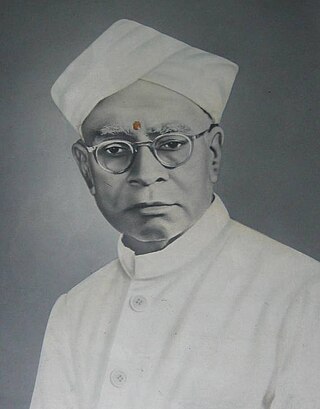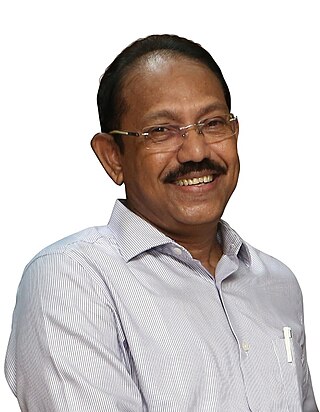
Tamil literature has a rich and long literary tradition spanning more than two thousand years. The oldest extant works show signs of maturity indicating an even longer period of evolution. Contributors to the Tamil literature are mainly from Tamil people from south India, including the land now comprising Tamil Nadu, Kerala, Eelam Tamils from Sri Lanka, as well as the Tamil diaspora.

The University of Madras is a public state university in Chennai, Tamil Nadu, India. Established in 1857, it is one of the oldest and among the most prominent universities in India, incorporated by an act of the Legislative Council of India under the British government.
Tolkāppiyam, also romanised as Tholkaappiyam, is the most ancient extant Tamil grammar text and the oldest extant long work of Tamil literature. It is the earliest Tamil text mentioning Gods often identified as Hindu deities. Mayyon as (Vishnu), Seyyon as (Skanda), Vendhan as (Indra), Varuna as (Varuna) and Kotṟavai as are the gods mentioned. The surviving manuscripts of the Tolkappiyam consists of three books (atikaram), each with nine chapters (iyal), with a cumulative total of 1,610 (483+463+664) sutras in the nūṛpā meter. It is a comprehensive text on grammar, and includes sutras on orthography, phonology, etymology, morphology, semantics, prosody, sentence structure and the significance of context in language.

Madras Christian College (MCC) is a liberal arts and sciences college in Chennai, India. Founded in 1837, MCC is one of Asia's oldest extant colleges. The college is affiliated to the University of Madras but functions as an autonomous institution from its main campus in Tambaram, Chennai.

Tamil Nadu Agricultural University (TNAU) is the state agricultural university of Tamil Nadu located in Coimbatore, Tamil Nadu, India.
Ecocriticism is the study of literature and ecology from an interdisciplinary point of view, where literature scholars analyze texts that illustrate environmental concerns and examine the various ways literature treats the subject of nature. It was first originated by Joseph Meeker as an idea called "literary ecology" in his The Comedy of Survival: Studies in Literary Ecology (1972).

Madurai Kamaraj University (MKU) is a public state university located in Madurai city, in southern Tamil Nadu, India, that was established in 1966. MKU is one of the 15 universities in India with the University with Potential for Excellence status, which was awarded by the University Grants Commission (UGC) in India. In 2021, the university was awarded an 'A++' grade from the National Assessment and Accreditation Council (NAAC) in its 4th cycle.

The Sangam literature historically known as 'the poetry of the noble ones' connotes the ancient Tamil literature and is the earliest known literature of South India. The Tamil tradition and legends link it to three literary gatherings around Madurai and Kapāṭapuram : the first over 4,440 years, the second over 3,700 years, and the third over 1,850 years before the start of the common era. Scholars consider this Tamil tradition-based chronology as ahistorical and mythical. Most scholars suggest the historical Sangam literature era spanned from c. 300 BCE to 300 CE, while others variously place this early classical Tamil literature period a bit later and more narrowly but all before 300 CE. According to Kamil Zvelebil, a Tamil literature and history scholar, the most acceptable range for the Sangam literature is 100 BCE to 250 CE, based on the linguistic, prosodic and quasi-historic allusions within the texts and the colophons.

Harris Sam Sahayam Lawrence was an Indian educationalist born in Nagercoil, Tamil Nadu.
Chennai is home to many educational and research institutions. IIT Madras, located in South Chennai is considered as the premier centre of engineering education in India. Anna University and the University of Madras are the oldest state owned universities which are ranked among the best universities in India. The College of Engineering, Guindy and Madras Institute of Technology, which are the constituent college of Anna University along with Alagappa College of Technology are the pioneer institutes of engineering education in India. Some of the oldest medical colleges India, the Madras Medical College (1835) and Stanley Medical College (1938) are located in the city. Notable, liberal arts colleges in the city include Loyola College, Madras Christian College, Presidency College, Stella Maris College, Women's Christian College and Ethiraj College for Women.

Iraiyaṉār Akapporuḷ, or Kaḷaviyal eṉṟa Iraiyaṉār Akapporuḷ, literally "Iraiyanar's treatise on the love-theme, called 'The study of stolen love'" is an early mediaeval work on Tamil poetics, specifically, on the literary conventions associated with the akam tradition of Tamil love poetry. The date of the work is uncertain, but it is generally taken to have been composed between the fifth and eighth centuries.

Kallidaikurichi Aiyah Nilakanta Sastri was an Indian historian who wrote on South Indian history. Many of his books form the standard reference works on the subject. Sastri was acclaimed for his scholarship and mastery of sources and was a recipient of the third highest Indian civilian honour, the Padma Bhushan.
In Tamil poetics, thinnais is a type of poetical mode or theme. A thinai consists of a complete poetical landscape - a definite time, place, season in which the poem is set - and background elements characteristic of that landscape - including flora and fauna, inhabitants, deities and social organisation. These collectively provide imagery for extended poetic metaphors, which set the mood of the poem.

Scott Christian College is an autonomous, co-educational, arts and science college in Nagercoil, Tamil Nadu. Run by the Diocese of Kanyakumari of the Church of South India, the college is graded "A" under National Assessment and Accreditation Council (NAAC) rankings in India and is rated 5-star.

Central University of Tamil Nadu (CUTN) is a Central University located in Thiruvarur, Tamil Nadu, India, and Prof. M. Krishnan is the Vice-Chancellor of this Central University, which now has over 2,000 students in 27 Departments under 12 Schools. CUTN was ranked in the 51–100 band among universities in India by the National Institutional Ranking Framework (NIRF) in 2022.
S.R.Janakiraman is a Carnatic vocalist and a musicologist. He is a recipient of several awards including the Sangita Kala Acharya, Kalaimamani from the Tamil Nadu Government and the Sangeet Natak Academy Award of the Government of India and the Padma Shri.

Education was considered important in Ancient Tamil as they considered the mind of the uneducated to be an "abode of darkness". The period of acquiring knowledge was during youth.
Margoschis Higher Secondary School is located in Nazareth, Tamil Nadu, India.

M. Rajendran served as Vice-Chancellor of Tamil University, Thanjavur, in Tamil Nadu, India. He is a Tamil Scholar, Writer and Publisher of Kanaiyazhi literary magazine in Tamil., He was the coordinator of academic committee, World Classical Tamil Conference 2010. He chaired the High Level Committee to amend the Tamil Nadu Public Library Act and Tamil Nadu Public Library Rules, which was constituted by the Government of Tamil Nadu in January 2022. Kalingar Mu. Karunanidhi Classic Tamil Award, Muthamilkavalar Ki.Aa.Be. Vishwanatham Award has been given to him.
Arun Bose is an Indian film director, screenwriter, editor and producer predominantly working in Malayalam Movies. He made his directorial debut with the Malayalam feature film 'Luca (2019)' starring Tovino Thomas and Ahaana Krishna in 2019. He has also produced, scripted, photographed and directed an experimental Tamil feature film titled ‘Alaiyin Thisai’. His second Malayalam feature film Mindiyum Paranjum produced by Salim Ahamed has Unni Mukundan and Aparna Balamurali in the lead. Arun Bose is also a visiting faculty at various film and media schools like L.V. Prasad College of Media Studies, Madras Christian College etc.













